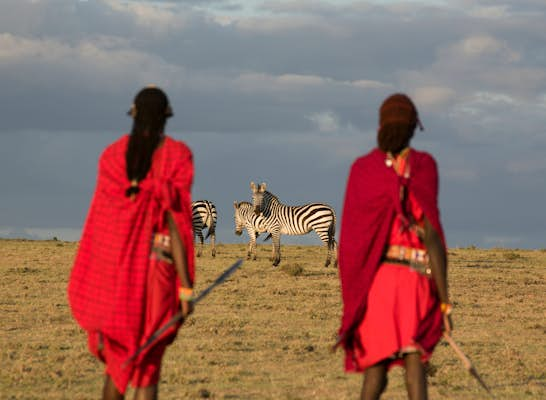Lonely Planet’s People You Meet series profiles people we think you should meet on your journey – those who make lasting impressions and help you connect more deeply with the destination.
When Steve Nkumum was a child herding cows in the Maasai Mara village of Talek, Kenya, he was perplexed to see non-Maasai-Kenyan tour guides dressed in his tribe’s colorful traditional garments.
“The guides were pretending to be Maasai. It was uncomfortable – someone talking about my culture who isn’t Maasai,” Nkumum says. “Maasai weren’t getting the opportunities to guide, even though it’s our land and culture.”

An intimate knowledge of the land
Seeing faux-Maasai guides showing tourists the Indigenous way of life in his village then whisking them away in safari vehicles, Nkumum had an idea. As a rightful guardian of his ancestral land, he realized his future lay in becoming Maasai ambassador. He applied to the Koiyaki Guiding School, a Basecamp Explorer project to empower Maasai tribal members who want to work in tourism in the Mara. “I feel it in my heart that we’re the right people to share information about the culture, land and wildlife. I feel proud to be a representative of the Mara,” he says.
Nkumum has an intimate knowledge of the region that no foreigner could replicate. He has spent the majority of his life in the bush, where he’s had frequent wildlife encounters and learned about the behavior of wildlife through observation. “I saw wildlife often when I was looking after our family cows in the bush,” Nkumum says. “I learned how to survive if I see a lion, leopard, cheetah, elephant or buffalo. As a guide, I apply this knowledge I gained as a boy about the behaviors of animals.”
After three years working as a naturalist at Basecamp, he was promoted to guide. For over a decade now, he’s been taking guests into the bush to observe wildlife. He shares his near-infinite knowledge about the Maasai Mara ecosystem, gleaned from both his formal education and his personal experience growing up in the area. Every moment under his guidance in Maasai Mara National Reserve and the nearby Naboisho Conservancy is simply magical.

A sense of wonder
Even though he’s spent his life in this wilderness, he leads with a sense of wonder, and no animal sighting is blah to him. Indeed, every encounter is a spectacle, with Nkumum exclaiming (in a hushed voice) “Wow!” and “Oh my gosh!” – as if he hasn’t witnessed such behavior hundreds of times. Nkumum is genuinely thrilled to come across animals in the wild, even though he’s seen them nearly every day of his life. “Every time I go to the bush, I see amazing things. We have incredible sightings daily,” he says.
Nkumum knows his surroundings so intimately that he can almost anticipate the animals’ behavior. On a night drive, we pulled into a pitch-black field, presuming it was empty. But once Nkumum turned on his red-light flashlight, we saw a pride of over a dozen lions. Nkumum pulled right up to a male lion and told us to wait a minute; like clockwork, it soon began to roar. He has even come to know many of the animals by name, including Nora the cheetah, Lenkisiau the lion and Luluka the leopard.

Leopards are his favorite animal in the Mara ecosystem, as they’re challenging to find. On a night game drive, we came across a young one hunting in a field. Nkumum was giddy with excitement as we watched the leopard until it eventually noticed us and dashed away. “She’s a shy one,” Nkumum sighed.
A less-traveled reserve
Nkumum prefers to take guests to Naboisho. “Conservation is a big challenge in the national reserve because there are a lot of trucks, and this changes the behavior of predators,” he says. “Lions see where the trucks are and know there’s potential prey. Sometimes 100 cars surround one cheetah baby and expose its location. Lions will go eat the baby cheetahs, which are helpless.”

I was stunned at how few trucks we saw in Naboisho compared to in the national reserve. Nkumum explains that the private reserve rarely sees more than 100 people per night. “There are fewer trucks, fewer people and less damage,” he says.
During most of our game drives in the conservation area, we were alone. I felt like I was living in a documentary as I watched lions mating, cheetahs running, a leopard eating its kill in a tree. I kept muttering, “It can’t get better than this” – and within minutes, it would.
At dawn, we saw a lioness eating the head of a wildebeest; within an hour, we were driving through a field with thousands of wildebeests. Nkumum noticed one of interest on the horizon: from a distance, he could tell that the wildebeest was in labor. Within 30 minutes, we experienced the miracle of watching a new life entering the world – it was just our truck and the wildebeests. “In the national reserve, there would have been 40 trucks watching the wildebeest give birth,” Nkumum says.

How to book
Basecamp operates several safari lodges near the Maasai Mara National Reserve and Naboisho Conservancy including Basecamp Masai Mara, Leopard Hill and Eagle View. All-inclusive rates start at $310, with package rates for multi-day safaris.
